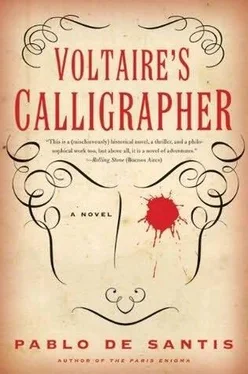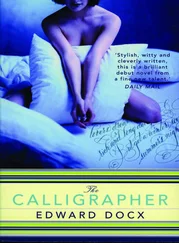“I thought I’d stay here, to write for you and for history, not travel with the dead.”
“If your path is one of history, then it’s only natural to be accompanied by the dead.”
The old coachman, Servin, came from the Swiss side of the border this time. He was transporting a couple from Avignon who had been killed in an avalanche. The tragedy had occurred ten years earlier, but the bodies had only recently been found. They were accompanied by a third coffin, but I didn’t bother to ask about it.
Three hours into our trip it began to rain. Ahead were only shadows and darkened trees. I shouted to see whether Servin wanted me to take a turn, but he didn’t reply; indifferent to the storm, he took another swig from his bottle and spurred on the horses.
He soon told me to get some sleep so I could take over for him later. A small iron cot hung down inside the carriage above the three coffins. I crawled up into it, settled onto one blanket, and pulled another one over me. I fell asleep for a few minutes, despite the swaying bed and squeaking chains, but a sudden jolt woke me from a dream in which I was supposed to take Voltaire’s body to some faraway place. Seconds later a violent lurch tossed me into the air and onto the third coffin.
The shuttered viewing window snapped open, as if someone had answered my knock. I peered in at the third passenger with the help of intermittent lightning bolts. It was the same curiosity that had led me, as a boy, to stare at the hanged man’s blue tongue, the soles of his feet carved with unrecognizable symbols, and the superstitious old women patiently pulling his nails and teeth. I was imagining an unsightly powdered face when I saw her: she had been beautiful, and that hadn’t changed. Her features spoke of not death but enchantment. I had found a secret door into a fairy tale.
I shouted for Servin to stop and waited for the storm to bring us another flash of lightning. The coachman didn’t bat an eye.
“Sometimes a dry climate preserves a body intact.”
“You call this rain a dry climate?”
“Maybe they embalmed her the Egyptian way. They say there are funeral parlors in Geneva that cover a body in animal fat and replace the organs with sawdust.”
I wanted him to stay and discuss the enigma, but he went back to the reins, unburdened by the curiosity that leads one to search for answers and find only problems.
We hid the carriage behind a copse of trees and spent the night in an inn, keeping the nature of our cargo from the owner so she would let us stay: gravediggers, Night Mail coachmen, and executioners were generally unwelcome guests. It was still raining outside and there was a leak above my bed. I moved, but the drips followed me, reminding me there was still a mystery to be solved.
I lowered myself out through a window, being careful not to wake Servin. Inside the hearse, I used the lamp I had brought to illuminate the face behind the glass. The closer I brought the light, the darker it was all around. The woman’s lips were pursed, as if she were about to reveal a secret. No Egyptian technique was capable of such perfection.
The next morning Servin found me asleep on top of the coffin and woke me with a cuff on the head.
“I’m going to tell the maréchal. That’s all he needs, for you to fall in love with a passenger. You take the horses as far as Avignon.”
I let the horses take me. They seemed much wiser, their soft side-to-side motion indicating a philosophical acceptance of the world’s contradictions. I began to talk to them and was sure they understood by the way they would sometimes toss their heads, as if agreeing with my arguments.
The storm had ended by the time Servin took the reins again. I didn’t dare tell him I was lost, but one glance at the surrounding forest and the old coachman immediately turned the horses around. He found the road to Avignon, delivered the two bodies from the Alps, and pocketed an enormous tip. He gave me less than a tenth but promised I would earn a little more once we reached Toulouse.
Whenever we passed through a town to replenish our food supplies, residents would close their windows and cross their fingers: the passing of a Night Mail coach was a bad omen. Twice we were refused entrance and forced to go another way. I tried to convince Servin to remove the black crêpe and carved allegorical images that decorated the hearse. Without these, it would look like any other carriage, but he refused.
“Maréchal Dalessius personally decorates each coach, and no changes are allowed. He wants us to be recognized from afar. Alternate routes and delays shouldn’t concern us. As he says: a detour is just another road.”
I had been eager to arrive, but now that the wheels (about to take one last turn before falling off their axles) were shakily tracing the route to Toulouse, I felt that mixture of exhaustion and unease that comes over a traveler whenever he reaches a new city.
We delivered the last coffin to the rue des Aveugles. The house belonged to M. Girard, a toy manufacturer. A long table displayed wooden horses painted blue, puzzles of city maps, porcelain dolls, and armies of tin soldiers that seemed to be returning in defeat: broken, hungry, their flag in tatters.
“Is she your daughter?” I asked.
“The Night Mail is known for not asking questions,” Girard replied.
“That’s true, sir,” Servin said, worried my curiosity might reduce or eliminate the tip altogether. “Please forgive him. Young Dalessius is new to the profession.”
The owner gave us each a few coins, but Servin snatched mine from me.
“You should be glad you rode here for free,” he said under his breath.
He asked the toy manufacturer whether he wanted us to move the coffin to another room in the house.
“Just there is fine,” Girard said, anxious for us to leave. Since we were no longer in danger of losing the tip, I asked about the cause of death.
“She ate a poison apple,” he snapped, pushing us toward the door.
We came out of the house, and Servin said good-bye there and then. A shipment was waiting for him on the outskirts of the city. He offered his hand, and in it was a coin. He told me to take care and, if anyone asked who sent me, to say anything at all, that I was an emissary to the devil or the Huguenots themselves, but under no circumstances was I to tell the truth.
I found lodgings near the market and took a room where I had to pay two nights in advance.
“Are you here for the festivities?” the proprietor asked. His face was scarred by illness and injury, and he was missing three fingers on his right hand.
“No. Is something happening tonight?”
“Celebrations begin in a few days.”
“And what are you celebrating?”
“The day the people of Toulouse had the courage to get rid of four thousand Huguenots. It’s the two hundredth anniversary.”
“They were expelled?”
“Straight to the hereafter. Never, sir, will you see such fireworks-not even in China! I lost three fingers when I was igniting them fifteen years ago, but don’t think I regret it. The moment I was hurt, I thought: Others have to smell gunpowder and are blown to pieces on the battlefield; I get to be a hero right here. I’d do it again, especially now, with the Calas family as the guests of honor. A whole year of boredom, sitting by the fire, greeting visitors as they come and go; a whole year of waiting just to watch the world explode. I can start to feel my lost fingers as the day draws closer.”
That night I looked out the window of my room and saw five men dressed in white robes, hoods pulled up, carrying an image of Christ. Voltaire had warned me: Be careful of the White Penitents. Windows opened as they passed, and wilted flowers showered down on their linen hoods.
Читать дальше
Конец ознакомительного отрывка
Купить книгу












